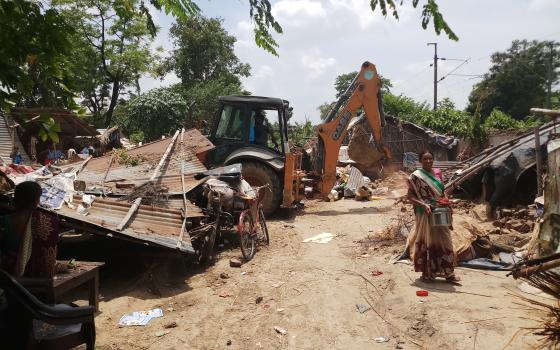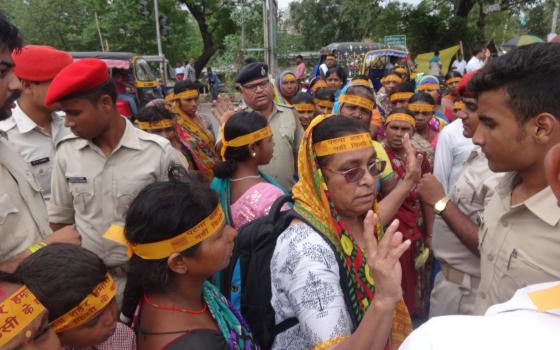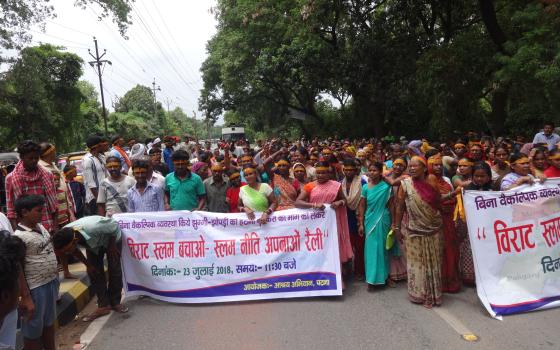In my memory, encroachment, demolition and bulldozers have always been tools used by engineers and architects to level lands and erect buildings. Since August 16, 2018, the city of Patna, India, has become very familiar with them, as we have been witnessing a government campaign against the poor. I am so angry and frustrated: how can we allow this to happen? Why does this happen? There is no justification for it.
Some city projects show a blatant insensitivity to the human suffering and misery of the "urban poor" of the city — people who have small shops, who work as domestic help, on construction sites, as rickshaw pullers. The "service providers," as I would like to call them, are not parasites, nor are they the scum of society as perceived by the dominant groups — the government and its bureaucrats. They are the unseen and unheard people who offer their sweat and blood to the beautification of the city — yet the city treats them as aliens.
How has it come to this? Why has civil society become mere spectators in this drama that is unfolding before us? On deeper analysis and reflection, my co-workers and I think we have discovered what the present government has up its sleeve. And I have begun to ask the question: has democracy been thrown out the window on the whim of a few selfish leaders? The truth is very painful.
The city of Patna has committed itself to creating a "Smart City," widening roads, and beautifying the city. Six lanes and metros are in the pipeline. And the government is accusing certain city residents of "encroachment" to conceal its real hidden agenda of taking over the land.
The government has no idea who the "encroaching" people are or the number of years they have been living here. Is it possible that people with children enrolled in nearby schools, people who have documents proving that they are citizens of the city — like the Voter ID card, Below Poverty Line receipts for food rations — do they suddenly become "encroachers?"
The government considers them encroachers because the land once belonged to the railway. The Government of Bihar bought it for development, and does not want to comply with the directions of the Supreme Court of India, which instructed "before eviction — rehabilitation." The Supreme Court expanded on this:
In any organized society, right to live as a human being is not ensured by meeting only the animal need of man. It is secured only when he is assured of all facilities to develop himself and is freed from restrictions, which inhibit his growth. All human rights are designed to achieve this object. Right to life guaranteed in any civilized society implies the right to food, water, decent environment, education, medical care and shelter. These are basic human rights known to any civilized society.
Where was the government when these documents were being written?
Today the government realizes that the perks that it hopes to gain from the corporate world cannot be obtained without pushing the people off the land they have lived on for two to three decades. Even the street vendors have been harassed. So, there is a new framework that is being placed before us, and we see that we can't afford for a government that cannot be honest, trustworthy and transparent to be in power and at the helm of things.
So, the poor are called encroachers because roads have to be widened, the city has to be beautified and shanties and the not-so-glamorous neighborhoods have to be wiped away. The design of a "Smart" city is in the making, but what we need are "inclusive and just cities!" The government needs to invest in making its citizens smart: educating them and setting up livelihood patterns so that the economy grows. Of course they cannot actually offer any of these; they are only available for a tiny fraction of the population!
The administration has gone so far as to say that anyone who obstructs the plan of the government — anyone who speaks on behalf of the people — will be arrested; a First Information Report (FIR) will be filed, and the consequences can be a 15,000 Rupee fine. When people have lost all means of livelihood and their homes have been demolished, where are they going to get 15,000 Rupees? So, fear has been instilled in the hearts of people and freedom has been snatched away.
Huge bulldozers come on the scene, accompanied by the government officials and their police. When people resist they are clubbed with lathi and charged with a crime; they are hounded as if they are criminals. There is no dialogue, no consent by the people as to how their city should be. It is the greed for money, for the promised equivalent of $160,000 U.S. dollars for the development of the city, versus the development of people. The development should be to provide shelter, water, hygiene, and livelihood — not to grab the existing homes and livelihood of people.
I was shocked when the District Magistrate of Patna, Mr. Kumar Ravi stated in Dainik Bhaskar, the local Hindi language daily paper, on May 9, 2018, that people who have been living along the railway tracks actually have land and homes in villages and towns and "hence are not entitled to relocation." This is such a gross violation of the direction of the Supreme Court of India, which states that before any demolition the onus of relocating falls on the government.
But recently, as a response to the growing number of evictions, and in order to get political coverage for our campaign, we got Shri Jitan Ram Manjhi — the former Chief Minister of Bihar — to take up the issue of the urban poor.
On September 23, we had a massive peace march, under the leadership of the former chief minister: thousands of vendors and members of homeless communities turned out and marched to the governor's house. People were really frustrated and angered at their livelihood being snatched away and their homes destroyed. The armed forces stopped us at three points along the way, but the march went on, braving the scorching sun.
It was a victory of a sort, for it was a clear sign that the people were ready to march to demand their rights. We can only continue working as an opposition party, using legal provisions and international forums to address this gross injustice to thousands of hungry people living in the urban areas as "service providers." The struggle goes on, and we shall not be moved. The God of our Journeys will be with us as we empower our people to face this challenge.
[Dorothy Fernandes a Sister of the Presentation of the Blessed Virgin Mary from India. She presently serves as Vice Provincial of the Indian province while continuing to be deeply engaged with the urban poor of Patna, Bihar.]



